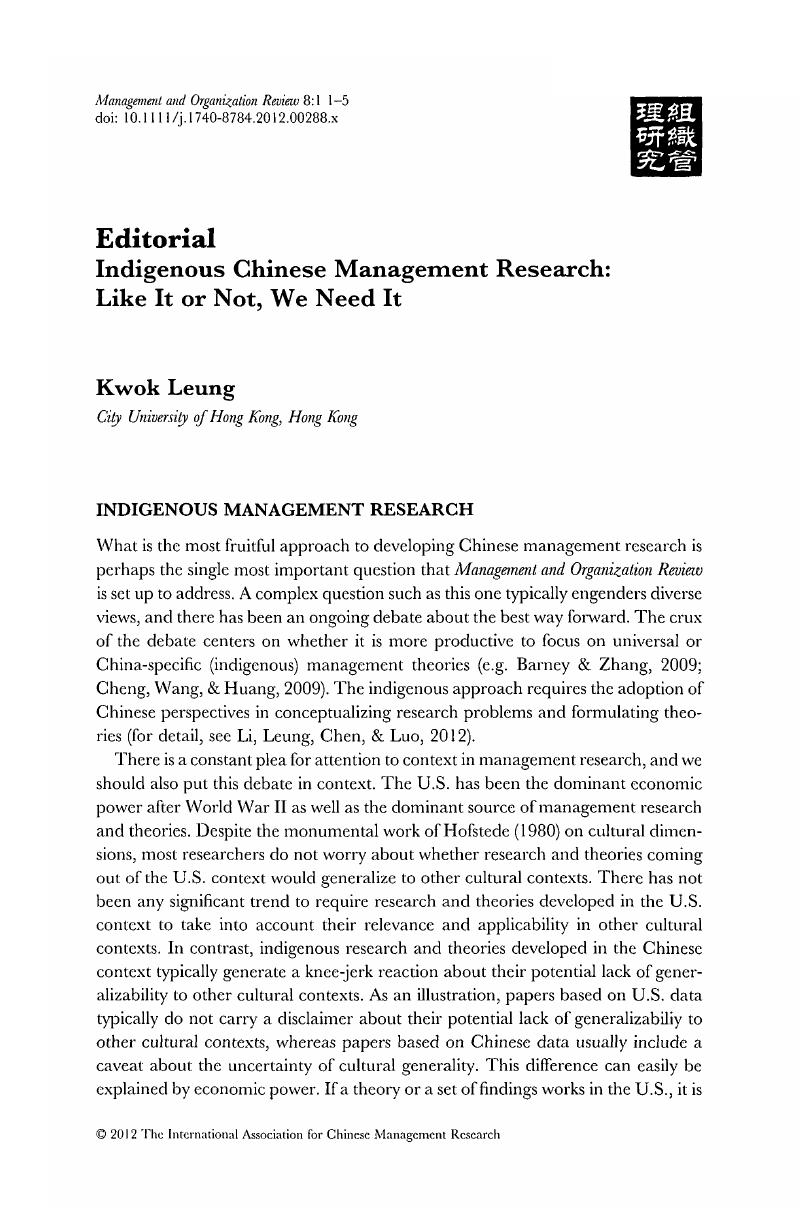Crossref Citations
This article has been cited by the following publications. This list is generated based on data provided by Crossref.
Wang, Greg G.
2012.
Indigenous Chinese HRM research: phenomena, methods, and challenges.
Journal of Chinese Human Resources Management,
Vol. 3,
Issue. 2,
p.
88.
Warner, Malcolm
2012.
Whither Chinese HRM? Paradigms, models and theories.
The International Journal of Human Resource Management,
Vol. 23,
Issue. 19,
p.
3943.
Zhang, Xiaojun
Fu, Pingping
Xi, Youmin
Li, Lei
Xu, Liguo
Cao, Chunhui
Li, Guiquan
Ma, Li
and
Ge, Jing
2012.
Understanding indigenous leadership research: Explication and Chinese examples.
The Leadership Quarterly,
Vol. 23,
Issue. 6,
p.
1063.
Tsui, Anne S.
2013.
2012 Presidential Address—On Compassion In Scholarship: Why Should We Care?.
Academy of Management Review,
Vol. 38,
Issue. 2,
p.
167.
Warner, M.
and
Rowley, C.
2013.
Demystifying Chinese management: introduction.
Asia Pacific Business Review,
Vol. 19,
Issue. 4,
p.
435.
Ip, Po-Keung
2013.
Wise Management in Organisational Complexity.
p.
122.
Holtbrügge, Dirk
2013.
Indigenous Management Research.
Management International Review,
Vol. 53,
Issue. 1,
p.
1.
Luo, Jin-hui
Wan, Di-fang
Cai, Di
and
Liu, Heng
2013.
Multiple Large Shareholder Structure and Governance: The Role of Shareholder Numbers, Contest for Control, and Formal Institutions in Chinese Family Firms.
Management and Organization Review,
Vol. 9,
Issue. 2,
p.
265.
Tsui, Anne S.
2013.
Making Research Engaged: Implications for HRD Scholarship.
Human Resource Development Quarterly,
Vol. 24,
Issue. 2,
p.
137.
Dowling, Peter J.
and
Donnelly, Noelle
2013.
Managing people in global markets—The Asia Pacific perspective.
Journal of World Business,
Vol. 48,
Issue. 2,
p.
171.
Rowley, C.
and
Warner, M.
2013.
Strategic challenges and issues for Chinese managers and management in the global economy: conclusions.
Asia Pacific Business Review,
Vol. 19,
Issue. 4,
p.
617.
Van Velsor, Ellen
Wilson, Meena
Criswell, Corey
and
Chandrasekar, N Anand
2013.
Learning to lead: A comparison of developmental events and learning among managers in China, India and the United States.
Asian Business & Management,
Vol. 12,
Issue. 4,
p.
455.
Ashforth, Blake E.
and
Kreiner, Glen E.
2014.
Dirty Work and Dirtier Work: Differences in Countering Physical, Social, and Moral Stigma.
Management and Organization Review,
Vol. 10,
Issue. 1,
p.
81.
Li, Xin
2014.
Can Yin-Yang Guide Chinese Indigenous Management Research?.
Management and Organization Review,
Vol. 10,
Issue. 1,
p.
7.
Corbett, Andrew
Cornelissen, Joep
Delios, Andrew
and
Harley, Bill
2014.
Variety, Novelty, and Perceptions of Scholarship in Research on Management and Organizations: An Appeal for Ambidextrous Scholarship.
Journal of Management Studies,
Vol. 51,
Issue. 1,
p.
3.
Horak, Sven
2014.
Antecedents and characteristics of informal relation-based networks in Korea:Yongo,YonjulandInmaek.
Asia Pacific Business Review,
Vol. 20,
Issue. 1,
p.
78.
Macklin, Robert
Martin, Angela
and
Mathison, Karin
2015.
An Integrated Model of Justice and Ethical Climates and the Influence of Cultural Diversity.
Management and Organization Review,
Vol. 11,
Issue. 1,
p.
101.
Wang, Greg G.
Lamond, David
and
Worm, Verner
2015.
“It’s the context all the way down!”.
Journal of Chinese Human Resource Management,
Vol. 6,
Issue. 1,
p.
2.
Chen, Tingting
Leung, Kwok
Li, Fuli
and
Ou, Zhanying
2015.
Interpersonal harmony and creativity in China.
Journal of Organizational Behavior,
Vol. 36,
Issue. 5,
p.
648.
Härtel, Charmine E.J.
2015.
International Encyclopedia of the Social & Behavioral Sciences.
p.
784.



